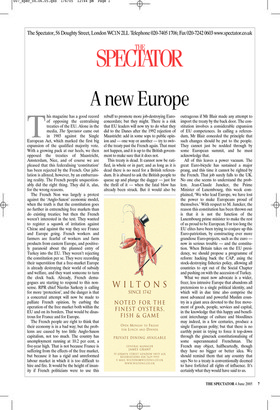A new Europe
This magazine has a good record of opposing the centralising treaties of the EU. Alone in the media, The Spectator came out in 1985 against the Single European Act, which marked the first big expansion of the qualified majority vote. With a growing pack at our heels, we then opposed the treaties of Maastricht, Amsterdam, Nice, and of course we are pleased that this federalising ‘constitution’ has been rejected by the French. Our jubilation is alloyed, however, by an embarrassing reality. The French people unquestionably did the right thing. They did it, alas, for the wrong reasons.
The French Non was largely a protest against the ‘Anglo-Saxon’ economic model, when the truth is that the constitution goes no further in entrenching free markets than do existing treaties; but then the French weren’t interested in the text. They wanted to register a squawk of irritation against Chirac and against the way they see France and Europe going. French workers and farmers are fearful of workers and farm products from eastern Europe, and positively paranoid about the planned entry of Turkey into the EU. They weren’t rejecting the constitution per se. They were recording their superstition that a free-market Europe is already destroying their world of subsidy and welfare, and they want someone to turn the clock back. Already, French demagogues are starting to respond to this nonsense. RPR chief Nicolas Sarkozy is calling for more ‘protection’, and the danger is that a concerted attempt will now be made to palliate French opinion, by curbing the operation of the free market both within the EU and on its borders. That would be disastrous for France and for Europe.
The French people are right to think that their economy is in a bad way; but the problems are caused by too little Anglo-Saxon capitalism, not too much. The country has unemployment running at 10.2 per cent, a five-year high. That is not because France is suffering from the effects of the free market, but because it has a rigid and unreformed labour market in which it is too difficult to hire and fire. It would be the height of insanity if French politicians were to use this rebuff to promote more job-destroying Euroconcordats; but they might. There is a risk that EU leaders will now try to do what they did to the Danes after the 1992 rejection of Maastricht: add in some sops to public opinion and — one way or another — try to swivel the treaty past the French again. That must not happen, and it is up to the British government to make sure that it does not.
This treaty is dead. It cannot now be ratified, in whole or in part; and as long as it is dead there is no need for a British referendum. It is absurd to ask the British people to queue up and plunge the dagger — just for the thrill of it — when the fatal blow has already been struck. But it would also be outrageous if Mr Blair made any attempt to import the treaty by the back door. The constitution involves a considerable expansion of EU competences. In calling a referendum, Mr Blair conceded the principle that such changes should be put to the people. They cannot just be nodded through by some European summit, and he must acknowledge that.
All of this leaves a power vacuum. The great Euro-bicycle has sustained a major prang, and this time it cannot be righted by the French. That job surely falls to the UK. No one else seems to understand the problem. Jean-Claude Juncker, the Prime Minister of Luxembourg, this week complained, ‘We who lead Europe, we have lost the power to make Europeans proud of themselves.’ With respect to M. Juncker, the reason this constitution has been thrown out is that it is not the function of the Luxembourg prime minister to make the rest of us proud to be European. For too long the EU elites have been trying to conjure up this Euro-patriotism, by constructing ever more grandiose Euro-projects, such as the euro now in serious trouble — and the constitution. When Britain takes on the EU presidency, we should propose a programme of reform: hacking back the CAP, axing the stock-destroying fisheries policy, allowing all countries to opt out of the Social Chapter and pushing on with the accession of Turkey.
What we must now advocate is a wider, freer, less intrusive Europe that abandons all pretensions to a single political identity, and which will in due time also comprise the most advanced and powerful Muslim country in a giant area devoted to the free movement of goods, people, services and capital, in the knowledge that this happy and beneficent interchange of culture and bloodlines may indeed, in a few centuries, produce a single European polity; but that there is no earthly point in trying to force it top-down through the gimcrack constitutionalising of some superannuated Frenchman. The French may object, halfheartedly, though they have no bigger or better idea. We should remind them that any country that says No to a treaty is conventionally deemed to have forfeited all rights of influence. It’s certainly what they would have said to us.


















































 Previous page
Previous page